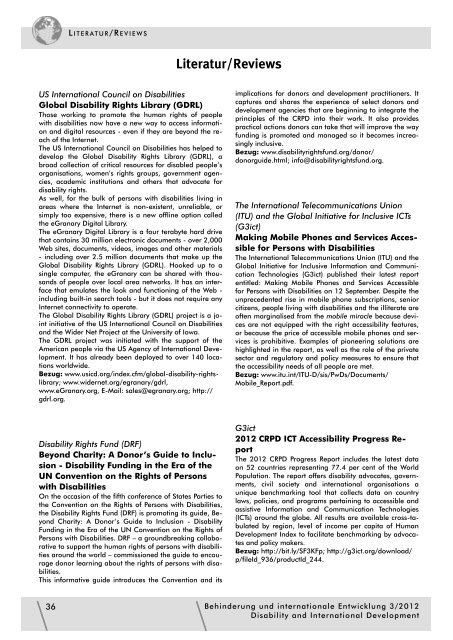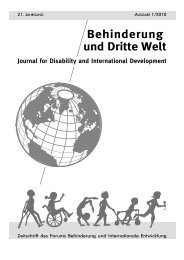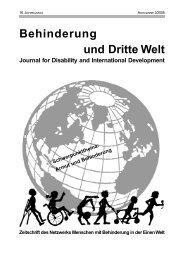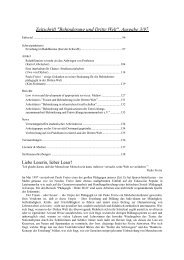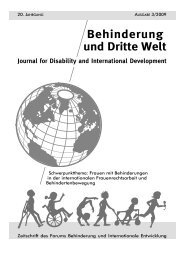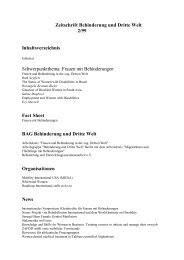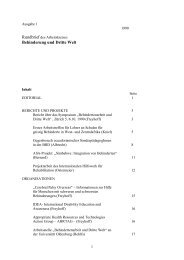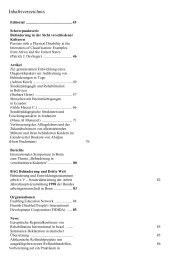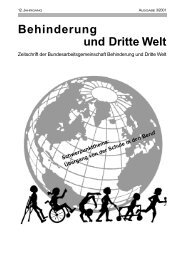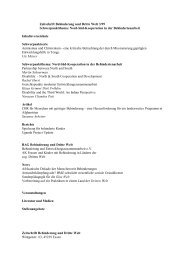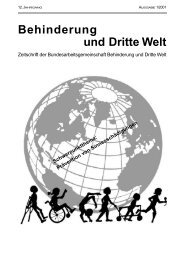Behinderung und internationale Entwicklung Disability and ...
Behinderung und internationale Entwicklung Disability and ...
Behinderung und internationale Entwicklung Disability and ...
Create successful ePaper yourself
Turn your PDF publications into a flip-book with our unique Google optimized e-Paper software.
L ITERATUR /REVIEWSLiteratur/ReviewsUS International Council on DisabilitiesGlobal <strong>Disability</strong> Rights Library (GDRL)Those working to promote the human rights of peoplewith disabilities now have a new way to access information<strong>and</strong> digital resources - even if they are beyond the reachof the Internet.The US International Council on Disabilities has helped todevelop the Global <strong>Disability</strong> Rights Library (GDRL), abroad collection of critical resources for disabled people’sorganisations, women’s rights groups, government agencies,academic institutions <strong>and</strong> others that advocate fordisability rights.As well, for the bulk of persons with disabilities living inareas where the Internet is non-existent, unreliable, orsimply too expensive, there is a new offline option calledthe eGranary Digital Library.The eGranary Digital Library is a four terabyte hard drivethat contains 30 million electronic documents - over 2,000Web sites, documents, videos, images <strong>and</strong> other materials- including over 2.5 million documents that make up theGlobal <strong>Disability</strong> Rights Library (GDRL). Hooked up to asingle computer, the eGranary can be shared with thous<strong>and</strong>sof people over local area networks. It has an interfacethat emulates the look <strong>and</strong> functioning of the Web including built-in search tools - but it does not require anyInternet connectivity to operate.The Global <strong>Disability</strong> Rights Library (GDRL) project is a jointinitiative of the US International Council on Disabilities<strong>and</strong> the Wider Net Project at the University of Iowa.The GDRL project was initiated with the support of theAmerican people via the US Agency of International Development.It has already been deployed to over 140 locationsworldwide.Bezug: www.usicd.org/index.cfm/global-disability-rightslibrary;www.widernet.org/egranary/gdrl,www.eGranary.org, E-Mail: sales@egranary.org; http://gdrl.org.implications for donors <strong>and</strong> development practitioners. Itcaptures <strong>and</strong> shares the experience of select donors <strong>and</strong>development agencies that are beginning to integrate theprinciples of the CRPD into their work. It also providespractical actions donors can take that will improve the wayf<strong>und</strong>ing is promoted <strong>and</strong> managed so it becomes increasinglyinclusive.Bezug: www.disabilityrightsf<strong>und</strong>.org/donor/donorguide.html; info@disabilityrightsf<strong>und</strong>.org.The International Telecommunications Union(ITU) <strong>and</strong> the Global Initiative for Inclusive ICTs(G3ict)Making Mobile Phones <strong>and</strong> Services Accessiblefor Persons with DisabilitiesThe International Telecommunications Union (ITU) <strong>and</strong> theGlobal Initiative for Inclusive Information <strong>and</strong> CommunicationTechnologies (G3ict) published their latest reportentitled: Making Mobile Phones <strong>and</strong> Services Accessiblefor Persons with Disabilities on 12 September. Despite theunprecedented rise in mobile phone subscriptions, seniorcitizens, people living with disabilities <strong>and</strong> the illiterate areoften marginalised from the mobile miracle because devicesare not equipped with the right accessibility features,or because the price of accessible mobile phones <strong>and</strong> servicesis prohibitive. Examples of pioneering solutions arehighlighted in the report, as well as the role of the privatesector <strong>and</strong> regulatory <strong>and</strong> policy measures to ensure thatthe accessibility needs of all people are met.Bezug: www.itu.int/ITU-D/sis/PwDs/Documents/Mobile_Report.pdf.<strong>Disability</strong> Rights F<strong>und</strong> (DRF)Beyond Charity: A Donor’s Guide to Inclusion- <strong>Disability</strong> F<strong>und</strong>ing in the Era of theUN Convention on the Rights of Personswith DisabilitiesOn the occasion of the fifth conference of States Parties tothe Convention on the Rights of Persons with Disabilities,the <strong>Disability</strong> Rights F<strong>und</strong> (DRF) is promoting its guide, BeyondCharity: A Donor’s Guide to Inclusion - <strong>Disability</strong>F<strong>und</strong>ing in the Era of the UN Convention on the Rights ofPersons with Disabilities. DRF – a gro<strong>und</strong>breaking collaborativeto support the human rights of persons with disabilitiesaro<strong>und</strong> the world – commissioned the guide to encouragedonor learning about the rights of persons with disabilities.This informative guide introduces the Convention <strong>and</strong> itsG3ict2012 CRPD ICT Accessibility Progress ReportThe 2012 CRPD Progress Report includes the latest dataon 52 countries representing 77.4 per cent of the WorldPopulation. The report offers disability advocates, governments,civil society <strong>and</strong> international organisations aunique benchmarking tool that collects data on countrylaws, policies, <strong>and</strong> programs pertaining to accessible <strong>and</strong>assistive Information <strong>and</strong> Communication Technologies(ICTs) aro<strong>und</strong> the globe. All results are available cross-tabulatedby region, level of income per capita of HumanDevelopment Index to facilitate benchmarking by advocates<strong>and</strong> policy makers.Bezug: http://bit.ly/SF3KFp; http://g3ict.org/download/p/fileId_936/productId_244.36<strong>Behinderung</strong> <strong>und</strong> <strong>internationale</strong> <strong>Entwicklung</strong> 3/2012<strong>Disability</strong> <strong>and</strong> International Development


